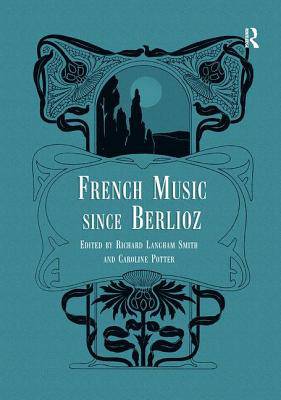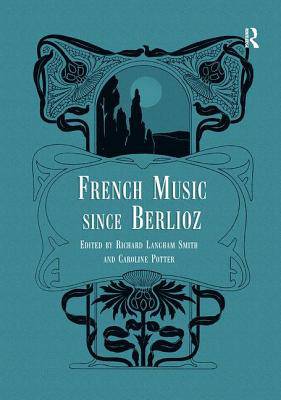
- Afhalen na 1 uur in een winkel met voorraad
- Gratis thuislevering in België vanaf € 30
- Ruim aanbod met 7 miljoen producten
- Afhalen na 1 uur in een winkel met voorraad
- Gratis thuislevering in België vanaf € 30
- Ruim aanbod met 7 miljoen producten
Zoeken
French Music Since Berlioz. Edited by Richard Langham Smith and Caroline Potter
Richard Langham Smith, Caroline Potter
Paperback | Engels
€ 77,45
+ 154 punten
Omschrijving
French Music Since Berlioz explores key developments in French classical music during the nineteenth and twentieth centuries. This volume draws on the expertise of a range of French music scholars who provide their own perspectives on particular aspects of the subject. Déirdre Donnellon's introduction discusses important issues and debates in French classical music of the period, highlights key figures and institutions, and provides a context for the chapters that follow. The first two of these are concerned with opera in the nineteenth and twentieth centuries respectively, addressed by Thomas Cooper for the nineteenth century and Richard Langham Smith for the twentieth. Timothy Jones's chapter follows, which assesses the French contribution to those most Germanic of genres, nineteenth-century chamber music and symphonies. The quintessentially French tradition of the nineteenth-century salon is the subject of James Ross's chapter, while the more sacred setting of Paris's most musically significant churches and the contribution of their organists is the focus of Nigel Simeone's essay. The transition from the nineteenth to the twentieth century is explored by Roy Howat through a detailed look at four leading figures of this time: Fauré, Chabrier, Debussy and Ravel. Robert Orledge follows with a later group of composers, Satie & Les Six, and examines the role of the media in promoting French music. The 1930s, and in particular the composers associated with Jeune France, are discussed by Deborah Mawer, while Caroline Potter investigates Parisian musical life during the Second World War. The book closes with two chapters that bring us to the present day. Peter O'Hagan surveys the enormous contribution to French music of Pierre Boulez, and Caroline Potter examines trends since 1945. Aimed at teachers and students of French music history, as well as performers and the inquisitive concert- and opera-goer, French Music Since Berlioz is an essential companion for anyone interested in the culture of France.
Specificaties
Betrokkenen
- Auteur(s):
- Uitgeverij:
Inhoud
- Aantal bladzijden:
- 388
- Taal:
- Engels
Eigenschappen
- Productcode (EAN):
- 9781138273450
- Verschijningsdatum:
- 2/12/2016
- Uitvoering:
- Paperback
- Formaat:
- Trade paperback (VS)
- Afmetingen:
- 175 mm x 246 mm
- Gewicht:
- 729 g

Alleen bij Standaard Boekhandel
+ 154 punten op je klantenkaart van Standaard Boekhandel
Beoordelingen
We publiceren alleen reviews die voldoen aan de voorwaarden voor reviews. Bekijk onze voorwaarden voor reviews.











